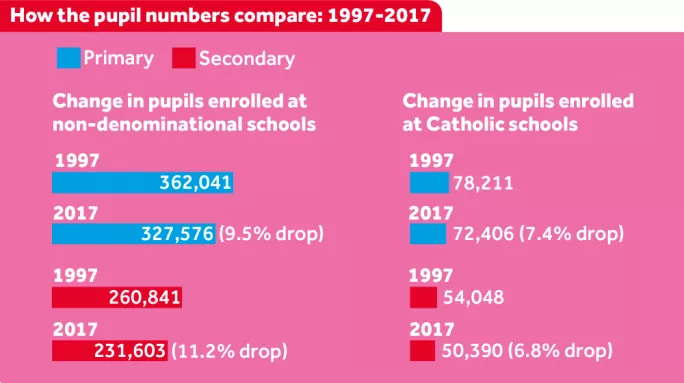Catholic schools ‘more relevant than ever’

The Church is more concerned with compassion, sensitivity and the elimination of discrimination than it is with “what people do in bed”, Father Michael McMahon has told the annual conference of Catholic secondary headteachers in Edinburgh.
Being Catholic and a member of the lesbian, gay, bisexual, transgender, intersex and questioning (LGBTIQ) community is not a dichotomy, insists McMahon, who advises schools on religious education.
At a time when Catholic schools are marking 100 years since the landmark education act that brought them into the state sector, their defenders claim that they can easily adapt to fundamental shifts in society’s values - and that they are more relevant than ever in an era of values-based education.
“There is absolutely no dichotomy between being a good Catholic and being part of the LGBTIQ community,” says McMahon. “There is no issue whatsoever” because “the same rules apply to everybody”. However, he continues: “If the [sexual] act is not ordered towards creation, then it is not procreative and therefore it is not a legitimate expression of sexuality, as far as we are concerned.”

Some LGBT activists who attended Catholic school have complained that little was done to tackle homophobia, and that schools are continuing to promote anachronistic sex education that does not help pupils to deal with issues of sexuality.
Jordan Daly, co-founder of the Time for Inclusive Education campaign, which wants “LGBT-inclusive education” in all schools, has written for Tes Scotland on the issue (“The LGBT bullying rife in schools endangers pupils”, 28 October 2016). He says all schools must ensure the learning environment for LGBT pupils is safe and supportive. He adds that his campaign has been working with the Scottish Catholic Education Service and some progress is being made.
Cara Spence of LGBT Youth Scotland says LGBT-inclusive work in Catholic schools is “absolutely possible”, and there is not only a moral obligation for schools to be inclusive but also a legal one, outlined in the Equality Act. She adds: “A small number of Catholic schools have taken steps to be LGBT-inclusive.”
Pragmatic response
Speaking to the Catholic Headteachers’ Association of Scotland (CHAS), McMahon stressed that schools should “tread lightly” where pupils’ sexuality and gender is concerned, and that teachers should be “kind, generous and forgiving”.
The Catholic Church has shown “enormous acumen” and has been pragmatic in its response to current debates about sexuality, says Lindsay Paterson, professor of education policy at the University of Edinburgh. This is typical of its willingness “not to push its demands too far” or “impose its theology”, and has kept the status of Catholic schools away from the danger of abolition, he believes. This year, Catholic schools celebrate 100 years since the 1918 Education Act brought them out of solely Diocesan control and into the publicly funded school system.
The history of Catholic education in Scotland is “a remarkable story”, says Scotland’s pre-eminent historian, Sir Tom Devine, who also addressed the CHAS conference.
Catholic schools, which had reached breaking point in the early part of the 20th century, are now thriving and the 1918 act has been “vital” for their development, says Devine, who is the product of a Catholic education, having attended Our Lady’s High School in Motherwell (see “Second-class education” box).
The Catholic community in Scotland - once blighted by “poverty and marginalisation” - has achieved “occupational parity in all areas”, says Devine, which begs the question: have Catholic schools served their purpose?
In fact, they are “more relevant than ever”, he tells Tes Scotland. He insists that future challenges - such as “gross materialism” and “the extraordinary seduction of the mass media” - make a “values-based education” all the more important. “Changes in society make the purpose of Catholic schools greater because these schools are not simply about education,” Devine says. “They are not just about the academic development of the child. They are also about the spiritual development of the child.”
The increasingly diverse pupil population in Catholic schools could be perceived as a threat. Indeed, the CHAS chair highlights it as a key challenge. But Devine describes this diversity as “an enormous vote of confidence” from the public. “It is more significant than any opinion poll that non-Catholic - and non-Christian - parents are prepared to [put their children in Catholic schools],” he says.
Enduring popularity
Figures uncovered by Tes Scotland show that rolls have held up better in Catholic schools than non-denominational schools. Paterson believes this is because they are “widely believed to be effective, so they attract more placing requests”.
However, he points out that the justifications for retaining Catholic schools are no longer about defending an embattled religious community. Rather, the best argument for a Catholic education is that it produces high exam results and good citizens - neither of which, he says, are religious reasons.
Ultimately, though, it is a moot point because no political party with a chance of attaining power in Scotland has the abolition of Catholic schools as a policy.
Both Paterson and Devine believe Catholic schools’ survival over the next 100 years will be down to Catholics themselves. Devine says: “The dissolution or the end of the denominational system could only come from Catholic parents. Anything else would stoke the fires of sectarianism.”
You need a Tes subscription to read this article
Subscribe now to read this article and get other subscriber-only content:
- Unlimited access to all Tes magazine content
- Exclusive subscriber-only stories
- Award-winning email newsletters
Already a subscriber? Log in
You need a subscription to read this article
Subscribe now to read this article and get other subscriber-only content, including:
- Unlimited access to all Tes magazine content
- Exclusive subscriber-only stories
- Award-winning email newsletters